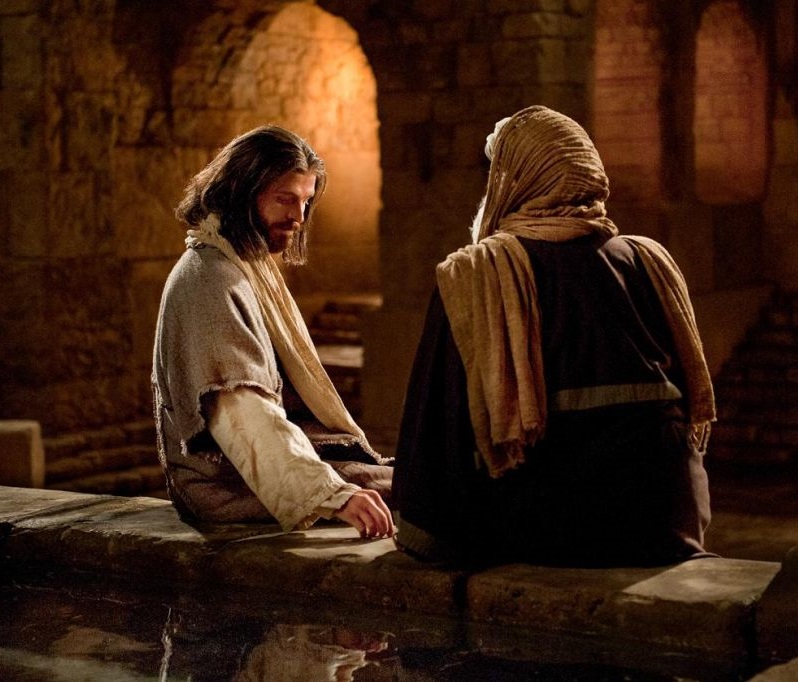JC & the Law: a visit from Nicodemus … (12/16/18)
The next episode of importance for our foray into the Bible’s portrayal of Jesus as a radical reformer of the Law comes in the first ten verses of John 3, where Jesus receives a visit from Nicodemus – a leader of the Pharisees. In this meeting, Jesus attempts to explain that “no one can see the Kingdom of God without being born from above1” (John 3:3); that “no one can enter the Kingdom of God without being born of both water and spirit.” (John 3:5) Of course, true to form, Nicodemus – like most other members of the traditional Jewish establishment – had no idea what Jesus was talking about (“And Nicodemus said: ‘How can these things be?’ And Jesus answered him: ‘How can you be a teacher of Israel and not understand these things?‘” ~ John 3:9-10). And yet, even though little else is overtly explained in this particular passage, it is still possible to examine its exact wording (especially juxtaposed with the overarching context of Jesus’ entire Gospel ministry) and thereby in all probability decipher what was meant thereby …
First & foremost, it is important to note that Nicodemus came to Jesus “by night” – that is, in secret and under cover of darkness (John 3:2a). And the reader is thus left to wonder: Why would that be? Why would a highly respected leader of the Pharisees choose to meet with anyone covertly, much less a noted “heretic” who was preaching a “gospel” other than the one traditionally accepted by the Jewish scribes and high priests? Well, he would do so precisely for that reason, of course; precisely because Jesus was indeed a notable opponent of Judaic tradition (and a desired reformer thereof), and Nicodemus would thus be scolded (if not openly ridiculed) by his peers for seeking such counsel – much less for granting Jesus the homage of being “a teacher who has come from God” (John 3:2b).
Secondly, the nature of salvation for Jesus Christ is quite obviously an ever-ongoing affair (see “What is born of the flesh is flesh, and what is born of the Spirit is spirit. Do not be astonished that I said to you, ‘You must be born from above.’ For the wind2 blows where it chooses, and you ever hear the sound of it, yet you never know from where it comes or to where it goes. So it is with everyone who is truly born of the Spirit” ~ John 3:6-8) – a state of being that, like the wind, is ever unpredictable and that thus must be continually renewed; concepts of perpetual impermanence and submission to the moment that actually underlie a number of Jesus’ more important teachings (see Mark 13:2‘s “Do you see these great buildings [of the Temple]? Not one stone will be left here upon another; all will be thrown down” and Matthew 6:34‘s “So do not worry about tomorrow, for tomorrow will bring worries of its own. Today’s challenges are enough for today”).

…………………………………………………..
1While literally accurate as is, this verse (and the one like it – John 3:7) is more often translated as “without being born anew” or “without being born again”, implying for fundamentalist Christians (a.k.a. “evangelical Christians” or “born again Christians”) that one is spiritually saved for eternity the instant one verbally professes a heartfelt allegiance to Jesus Christ – the one & only Son of God – as one’s “personal savior.” The problem with this interpretation, of course, is threefold – first, it is patently immoral to worship a God (who is supposedly composed of a Love that is perfect, that is, completely unconditional – see Matthew 5:48 + 1 John 4:18 et al) who only allows a handful of avid worshipers to enjoy an infinite reward merely for cowering before him (and this, regardless of their potential lack of any true moral fiber); second, it violates the overarching precept of Jesus’ entire ministry – where he says over & over & over again that he does NOT want to be worshiped at all (see Matthew 19:17, Mark 10:18, Luke 18:19, John 5:41, John 7:16, John 8:50-54, John 12:44 et al) but rather simply wants us all to care actively (John 13:15-17) & humbly (Matthew 18:3-4) & self-sacrificially for others (Luke 9:23) – especially the downtrodden in our communities (Matthew 25:35-40) &/or the enemies in our midst (Matthew 5:44-48); and third, it contradicts the fundamental meaning of the very passage that encapsulates it – a passage that quite plainly says that the person who qualifies for salvation – namely, the one “who is born of the Spirit” – is the one who, like the “wind”, chooses to continually re-adhere to the teachings of Christ; the one who chooses to Love in each moment anew, just like the wind that knows neither from whence it comes nor to whence it goes.
2The terms translated as “wind” and “Spirit” in this passage are represented by the same Hebrew word in the ancient manuscripts (pneuma/pneumatos Strong’s #4151) – a fact which further supports the above-mentioned contentions.




 ;
;